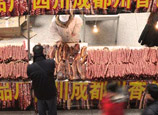
ENCOURAGING DONATIONS
The State Council, China's cabinet, issued regulations on voluntary organ donation in 2007. But China has struggled to popularize the practice, as traditional Chinese customs call for people to be buried or cremated with their organs intact.
It is no secret that organs taken from executed prisoners are an important source for organ transplants in Chinese hospitals.
This reliance, however, will end within two years, as the development of the organ donation system shines a light on the practice, said Vice Minister of Health Huang Jiefu in November last year.
The donation of a human body can help cure nearly 100 patients in need of organ and tissue transplants, said Fang Ya, vice president of the RCSC's Jiangxi branch.
"A pair of corneas alone can help six to eight patients with eye diseases recover," she said.
The Jiangxi branch foresees the regulation leading to an increase in the number of donors, according to Dai.
She admitted that the branch will have to face "service challenges" with more people coming to register for organ donations.
In preparation, it has started training volunteers to help with the organ donation procedures. So far, 221 people have taken such lessons.
In promoting public awareness around organ donation, the branch has built a garden-like memorial yard to honor organ donors at the Qingshan Cemetery in Nanchang, the provincial capital.
"On Tomb-sweeping Day last year, we held a mourning ceremony to promote their philanthropic deeds," Dai said.
She said the RCSC has planned other measures such as setting up a special fund to subsidize donors whose family are poverty-stricken.
In the next step, Dai said, the organization will coordinate with certain medical institutions to set up stations to receive human organ and tissue to complete the system building.
However, some members of the public may doubt the RCSC's capabilities here as it has come under fire after a series of mismanagement scandals.
Dai said the new regulation has placed supervising responsibility for the management of human organ donations with health departments.
"Anyone who violates the law in the transplanting process will face administrative and legal penalties," she said.
Wang Hua, an elderly resident of Honggutan New Area of Nanchang, said that he would not mind if his relatives decided to donate his body after he passes away, as long as the relevant departments keep the process transparent.
"Making a free donation after I die would be the the most meaningful thing to do for those who are alive," Wang said.

















 China's weekly story (2013.01.21-01.27)
China's weekly story (2013.01.21-01.27)


![]()
